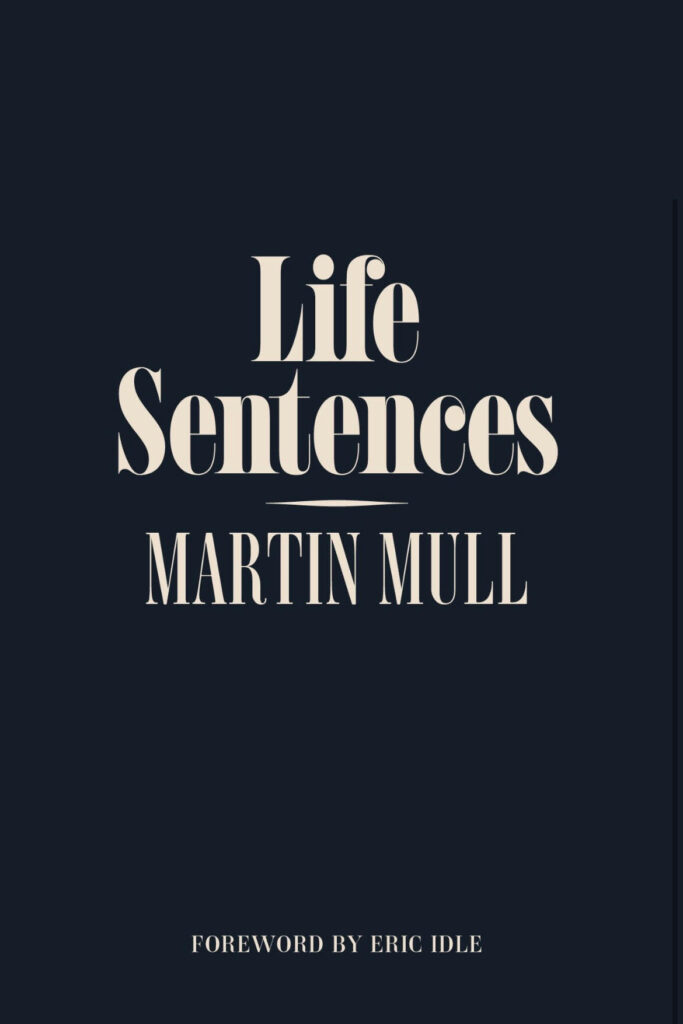Comedian Martin Mull’s Posthumous Collection of Short Stories Is a Labor of Love He Concealed Until His Death
His male antiheroes are cranky, stubborn, and beleaguered, sandwiched amid the absurdities of life, the depredations of aging, and black existential angst.

Martin Mull: ‘Life Sentences’
Hard Cider Press
Hardcover, 380 Pages
There are many Martin Mulls. We know him as a jazz guitarist and singer/songwriter of parodic ditties. We also know him as a character actor in some of our most beloved TV series and films. We even know him as a highly acclaimed painter, probably his first and most serious vocation. Now, on the one-year anniversary of his untimely death, Mull has added writer of fiction to his broad list of accomplishments.
“Life Sentences” is a posthumous collection of Mull’s short stories, published by Hard Cider Press. A labor of love that he kept under wraps until the day of his death, it appears just as the world takes full stock of his life and work. Mull, as it turns out, was hiding yet another talent behind his mild-mannered facade.
“Life Sentences” is classic Mull, in the sense that he was a master at being conventionally unconventional. He has always infused prosaic cultural forms with his own peculiar blend of cynicism, tenderness, and absurdist humor. The same is true here. The prosaic, in this case, is Mull’s choice of protagonist.

Every main character in this collection is a man from flyover country: aging, despondent, middle class, white, and generally facing a total collapse of meaning. Stuck in their peculiarly American ruts, they stoically seek to address their inner anguish, barrelling through it with varying degrees of success. It often doesn’t go very well.
We have all seen these men (and some of us are them), in their ball caps and khakis, staring meditatively at shelves in hardware stores, fishing off of bridges, or stoically alone at a corner bar. They represent a slowly vanishing style of American manhood. Mull peels back the curtain on their inner workings, taking us into their longings and dysphorias. They are a collection of dyspeptic oddballs, generic on the outside yet all scratching away at some elusive itch at the bottom of their souls.
“State of the Artist” places us in the uncomfortable skin of an aging painter, a man who teaches at a local art school in order to afford himself some lone studio time. Unfortunately, he is divorced, utterly alone, and uninspired. A homeless youth who resembles a Michelangelo angel renews his painting career, but not before many awkward misunderstandings and mishaps take place. Mull is a fan of the Maupassant twist and he wields it wryly.
“Additional Information” is an elderly man’s account of his doctor’s physical, and is one of the most comically grotesque assessments of the aging male body ever put to paper. “Real Estate” follows an elderly man attempting to find a room of his own while navigating his arrhythmia and a world that confounds him at every turn. “Second Team” takes us through the painful and hilariously labyrinthine twists of a sitcom’s unlikely development; it’s Mull’s only nod to Hollywood life.
The longest story of the book, closer to a novella, is “Sick and Tired,” which follows an obedient insurance adjustor so desperate to escape his stultifying life he feigns Alzheimer’s. The gambit works, but not without sending him through a wild string of misadventures that takes him through a nursing home, back to his marriage, and then out on a pleasure cruise.
Another disaster strikes, and he is finally left to his own misanthropic devices. What confounds us in this story is the hero’s utter lack of imagination. Why didn’t he go to Buenos Aires and learn how to Tango? We find ourselves submerged in a suburban American malaise reminiscent of the work of Raymond Carver.
Mull has never been a sentimentalist, no matter what his medium. He would rather chuckle drily than be verklempt. Mull the writer, however, is downright bleak. His male antiheroes are cranky, stubborn, and beleaguered, sandwiched amid the absurdities of life, the depredations of aging, and black existential angst.
Many of them are trapped in middle class hells so desperately bland you want to jump into the pages and jail-break them out. Before you can, however, they find their own unique solutions. However beleaguered, they are not going down without a fight.
Mull is also not a precious or extravagant literary stylist. His characters would probably object if he was. His structuring is as pragmatic and straightforward as a Ramada Inn. His descriptions are spare, and he is mostly an expositional storyteller. This is not ornately wrought, writerly writing. Even so, we find ourselves looking in on his lonely men and worrying about them, much as we might worry about our widowed father, or a wayward uncle.
Even as we worry, his men go their own way. Mull’s protagonists, such as the fastidious health nut struck with cancer, the orthodontist in a touring rock band, or the chronic alcoholic searching for his high-school love, are always reaching for something. They are a continuation of classic American characters treated similarly in the short fiction of E.B. White and Willa Cather. “The Second Tree from the Corner” by White or “Paul’s Case” by Cather come to mind.
Mull the short story writer is of this tradition. Elegiac, comic, and at times purposefully appalling, he is nonetheless a man of middle America. He is a skilled Midwestern satirist, transcribing the mournful swan song of the American man in his own idiosyncratic style.

